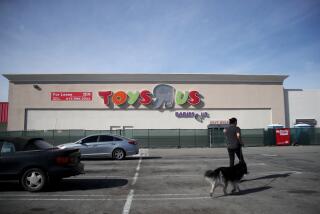Owens Making Valiant Bid to Benefit Holders
- Share via
Are you bored with the repeated story of Wall Street middlemen making millions in fees for breaking up some of the nation’s oldest industrial companies? Well, take heart, because in Toledo, they’re out to eliminate the middleman and preserve value for shareholders in a fine old company.
Owens-Illinois, the nation’s largest bottle manufacturer, will decide within the next week to accept or reject a takeover offer of $60 a share from the Wall Street firm of Kohlberg Kravis Roberts & Co. Last Monday, Owens directors rejected an earlier, $55-a-share offer from KKR and substituted their own plan to sell $1 billion worth of Owens assets and to buy about a third of the company’s outstanding stock. Doing so would increase Owens’ reported earnings per share and thus its stock price, thereby placating shareholders disappointed that the takeover was rejected and at the same time keeping the 80-year old company independent.
That buyback plan is currently suspended while the Owens board considers KKR’s new, $60 offer, and of course anything can happen. But chances are the Owens directors and managers will figure out a way to reward shareholders and still keep the company independent.
Less Than It’s Worth
A case of directors and managers protecting their jobs? No, a case of refusing to sell the company for less than it’s worth.
To explain: What KKR is proposing is a leveraged buyout, meaning that on behalf of a group of investors the Wall Street firm buys Owens, using mostly borrowed money for the $3.6-billion purchase price. Then the company goes private, no longer pays dividends to public shareholders but uses all of its cash flow to pay back that debt. In effect, the company buys itself.
But a few years from now, with most of the debt repaid, the KKR investors would own assets worth more than $3 billion, including the world’s most efficient bottle-making plants. And yet they would have invested and risked very little.
Typically, at that time, the KKR group would cash in by selling those valuable assets back to the public in a new stock offering. Thus a fine old company would come full circle and make some people very rich without becoming any more efficient or productive than it is today. And, along the way, from the initial buyout through the resale, Kohlberg Kravis Roberts & Co. would collect tens of millions in fees. Is there an easier way to make money?
But who needs the middleman? If KKR is sure it can pay $60 a share and recover its investment by restructuring Owens, then, the company’s managers and directors are saying, it must make more sense to keep the company and achieve the restructured value for existing shareholders. One obvious and immediate saving would be the fees paid for the leveraged buyout.
Really Worth More?
Is Owens-Illinois really worth more than KKR is offering? Some of its shareholders must be blinking at their annual reports and wondering why people are talking about values of $60 a share for a company that lists shareholders equity, or book value, of around $28 a share and which sold in the low $40s before KKR’s first offer last December.
The answers are private market value and cash flow. The first refers to the way that investment bankers, company managers, directors and institutional investors look at a company these days--not as a whole, but in segments, calculating a value for each asset as if it were up for auction at that moment. Analyst Thomas Cope of the Dillon Read investment firm did that with Owens last October and came up with a value of $63 a share by calculating, for example, a value of $33,500 for each bed in the company’s growing nursing home division, and a value of $2 billion for the glass business.
The other measure is of the company’s pretax cash flow, which in Owens’ case is tremendous. In the first half of this decade, Owens invested heavily to make its glass production the most efficient in the industry. So now it is reaping the rewards of being the low-cost producer in a no-growth business. Its healthy income from glass, plus substantial depreciation from those past investments, make Owens a pretty rich firm. Securities analyst Arthur Stupay of the Cleveland investment firm Prescott, Ball & Turben, estimates Owens’ pretax cash flow at $750 million a year, which translates to $12.45 a share.
Such cash spells opportunity. It can be used to finance a leveraged buyout so that KKR’s investors can buy the company cheaply. Or it can be used to lift the stock price and invest in future growth businesses for the benefit of Owens shareholders. Put that way, it seems like such a simple choice for the company’s shareholders that you have to wonder why the leveraged buyout middlemen were allowed to get so far, and so rich, in the first place.
More to Read
Inside the business of entertainment
The Wide Shot brings you news, analysis and insights on everything from streaming wars to production — and what it all means for the future.
You may occasionally receive promotional content from the Los Angeles Times.










